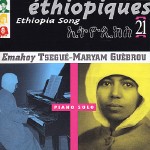Dançe-Êh Sá
(¡RARÁ)
In the nearly forty years since Brazil's subversive Tropicalístas began issuing their satirical treatises, no member of that cultural insurgency has remained truer to the original dada spirit than Tom Zé. Ever the experimentalist, Zé is celebrating his 70th year with this dense rain forest of wordless chants, chirping whistles, manic drum beats and deviously deployed electronica. Subtitled "Dança Dos Herdeiros do Sacrifício" (Dance of the Heirs of Sacrifice), this record is Zé's response to MTV marketing research identifying a hedonism, consumerism and social irresponsibility in today's youth. He says, "In order to reach these youngsters, I changed everything I ever produced and followed Chico Buarque's suggestion that the song is over." Revolutions per minute indeed.
Listen to: Cara-Cuá

Taabali
(Dunya)
Even drummer lovers find most percussion enesembles a bore. Sure, hearing unison playing at breakneck speed through mind-melting time changes can be a thrill. But at a certain point you just want to to say fuck virtuosity, let's dance. And everyone knows you can't shake your booty to music that has no bottom! Amadou Kienou's Ensemble Foteban, like all the heaviest percussion groups—Olodum, Kodo, the drumline of Florida A&M's marching band—has that elusive element in spades. The lilting balafon titilates, the sweet vocals uplift, but the key sound everpresent on this recording from Burkina Faso is the surging, insistent pounding at its rock-solid base. Major kudos to the recording engineer who captured it so faithfully.
Listen to: Ouagadougou Kalou

Various
(Emusica)
This year's revival and rerelease of the Fania records catalog, after languishing in legal limbo—and a moldy warehouse—for years, is a landmark event in the history of Latin music. If, in the 1960s and '70s, New York City was the Vatican for the salsa orthodoxy, Fania was the Bible. Crucial recordings, masterpiece upon masterpiece, delivered the liturgies of the exalted: singers like Lavoe, Cruz and Rivera; band leaders like Pacheco, Roena and the brothers Palmieri; virtuosos like Colón, Harlow, and Barretto. And now, after years of suffering with insultingly poor-quality one-off CD releases, only sporadically available, we have access at last to the high holy vaults, completely remastered, with original cover art and newly added bilingual liner notes. Amen hermanos y hermanas.
Listen to: Periódico de Ayer by Héctor Lavoe (from De Ti Depende)
Listen to: Jala Jala by Ismael Rivera (from Controversia)

In My Own Time
(Light in the Attic)
Accidental muse of the Greenwich Village folk scene, Sweet Mother K.D., as she was known to fellow travelers, was an enigmatic artist of unnerving depth and abundant sophistication. She's been unfairly burdened with the label "the Billie Holiday of Folk," yet the comparison is not without merit. Like Lady Day, who acknowledged a debt to Louis Armstrong's phrasing and intonation, Karen's voice has an unmistakable horn-like quality (Bix Beiderbeck's muted cornet anyone?) and she sings her lyrics like a soloist delivering notes, pushing the tempo, laying back, placing emphasis at unexpected moments. Despite her talent, Karen disdained performing in public and liked recording studios even less—In My Own Time is one of only two recordings Karen made*—and her ambivalence is palpable in the melancholia that inhabits every word she sings.
Listen to: Something on Your Mind
*Released on disc a decade ago, Karen's other record, It's so Hard to Tell Who's Going to Love you the Most, has just been reissued with a bonus DVD featuring rare footage. Wow.
Watch: It Hurts Me Too

Mbaqanga Songs
(Honest Jons)
On the surface, this collection of faintly calypsonian township tunes from South Africa, recorded in the UK in 1967, is a charming artifact of a bygone world: the black immigrant music scene in 1960s London. And cheery as these ditties first seem, lingering on the edges is the mournful tone of lives lived in exile from the apartheid abomination. Plain and simple, it is the happy music of sad men. Gwigwi Mrwebi was among the first wave of South Africans musicians to hit London. He arrived as a cast member of the "All African Jazz Opera" King Kong, which billed itself as capturing the "life, colour, and effervescence—as well as the poignency and sadness—of township life," and he sought asylum rather than return to his homeland. Reissued at long last, this recording joins Mrwebi with fellow South Africans Dudu Pukwana, Chris McGregor and Ronnie Beer.
Listen to: Zobongo

Selda
(Finders Keepers)
Belting out radical poetry with heart-wrenching conviction, Turkish folkie-cum-siren of psychedelia Selda Bagcan has endured imprisonment, banning, restricted travel and other indignities, all for love of rocking the paranoid authorities. Istanbul in the 1970s was, for legions of Anatolian space cadets, the primo launching pad for the taking the mother of all acid trips. And in a world of progressive music dominated by men, Selda was the mother of Turkey's countercultural revolution. This release, originally from 1976, finds Selda amid a din of flanging, fuzzed-out guitars, crooning lines like "The sweat of the working-class amalgamates with the soil." Tune in, turn on, and drop the 13 clams it'll take to get this record.
Listen to: Yaylalar

A Very Well Travelled Man
(Omni Recording Corporation)
Long before the Dixie Chicks spoke truth to power and Willie Nelson toked his way across the stage at Farm Aid, country music had a smooth singin' pop idol serving up songs of social conscience and commentary. He even had a tune castigating parents who teach their kids racist hate. And it reached #1 on the country charts! Outside of that heady five-week period, though, Henson Cargill's performing career rolled by largely unnoticed. He did release half a dozen albums, mostly featuring standard country-pop fare, but in and amongst the tales of love and loss were other incendiary message songs—skewering involvement in Vietnam, mindless conformity, neglect of the poor, the wasteful space race. Makes you kinda proud to be an Amurcan.
Listen to: Skip a Rope

Ethiopia Song
(Buda Musique)
The delicate, spellbinding piano solos on this disc—among the most unusual sounds ever recorded in East Africa—will be a revelation to those already wise to the hallucinatory enchantments of Ethiopia's music. Now 83, Tsegué-Maryam Guèbrou is a devout nun of the Ethiopian Orthodox Church living in a Jerusalem monastery. As a child, born into Abyssinian high society, she was sent off to Basel, Switzerland, to receive a fine European education. Lucky for us that included piano lessons.
Listen to: Mother's Love

Which Way Now
(Cuneiform)
You can watch all 19 hours of Ken Burns' PBS documentary Jazz, but you will never learn that one of the most monumentally vital jazz scenes in the history of the music flourished in London during the 1960s and '70s. (The term "British jazz" may sound like an oxymoron to some, but only a moron would promote the notion that jazz is an exclusively American endeavor.) On a nightly basis, the stages of Peanuts, Ronnie Scott's and 100 Club were jammed up with homegrown Brits, Caribbean emigrants and South African exiles serving up soaring soundscapes of searing intensity. And bassist Harry Miller, who arrived in London from Johannesburg in 1961 (the same year as Gwigwi Mrwebi, see above) was seemingly everywhere slapping strings in the middle of things. The stunning release of Which Way Now, a never-before-available radio aircheck, presents Miller's group Isipingo. The two most incandescent stars in this all-star sextet are the brilliant English saxist Mike Osborne and the beloved South African trumpeter Mongezi Feza who, shockingy, died less than a month after this music was made.
Listen to: Eli's Song

Mestizo Music: Rebelión en América Latina
(Trikont)
Left-wing support for the anti-globalisation movement is spreading across Latin America, and exuberant punks banging drums, brandishing guitars and rapping withering jeremiads against the Nafta machine are at the front of the pack. Not content to merely trash a few Starbucks like the spring-break liberals to the North, these brats are actually organizing, planning and imposing real political pressure on their local goverments. And, as this compilation of astonishing tracks from Mexico, Argentina, Brazil and beyond makes loud and clear, their making a shitload of amazing music along the way. ¡Arriba, abajo, la junta pa' carajo!
Listen to: La Piquadura by Karmelo Santo
Listen to: Los Métodos Piqueter@s by Las Manos de Filippi

Congotronics 2: Buzz'n'Rumble From the Urb'n'Jungle
(Crammed Discs)
The buzz in African music is as old as the hills. The ancient traditions dictate that when you make an instrument from an animal, you place inside a fetish, its vibrating rattle being a manifestation of the animal's spirit. The current buzz in African pop is the messy, distorted ecstatic din eminating from the suburbs of Kinshasa, where a new crop of streetcorner bands are playing junkyard-part instruments, amplified with ramshackle DIY sound systems. It's a grunge scene so filthy, it makes mid-'80s Seattle sound like a pep rally. Congotronics 2 is a collection of tunes from best of these bands. Just like their elders, the kids know, it's all about the buzz.
Listen to: Koyile/Nyeka Nyeka by Kasai Allstars featuring Tandjolo
